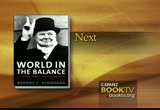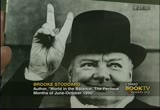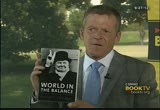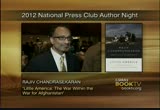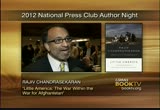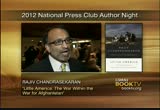tv Book TV CSPAN November 24, 2012 11:30am-12:00pm EST
11:30 am
driving over are going under in on the subway. i wanted to stress that we have an incredible natural resource right on our front doorstep. it is a natural river. very few levees on it. bald eagles along this river. it's really incredible. not exactly a fully clean yet, but we're working on it. we get 90 percent of our drinking water from this river. is pretty important for every person who lives in the washington area. >> can you give us a couple of examples. >> well,. if you live on the potomac river have to pick the sites of the nation's capital. at the disposal of the most significant building that's actually on the atomic. >> in your research and guessing he's been some time on their --
11:31 am
the river. >> yes. visit them domestic and the hikes, crying -- trying to combine history with recreation and public accessibility. all sides that people can actually go to and take a hike while they're there or jump in a canoe or kayak unworn and have a good time on the river. it's an enormous recreation opportunity .. >> this is just under half an hour.
11:32 am
>> host: and you're watching book tv on c-span2, and we're on location at george mason university. every fall they have a book it's value called fall for the book, and one of the authors who's speaking at the book festival is brooke stoddard. and here is his book, "world in the balance: the perilous months of june-october 1940." brooke stoddard, world war ii, it started about six months prior to your book. what was happening in europe in june 1940? what was the situation? >> guest: the war had started in september 1939, peter, and germany had overrun poland. hitler's idea at this point was to invade france and knock britain out of the war thereby with the intent later on to invade the soviet union. he just, he hated communism. this was one thing that was
11:33 am
really part of his agenda. he was actually going to invade france in winter time, in november or december. he had to put that off because -- >> host: of 1939? >> guest: of 1939. because the invasion plans fell into the hands of the french and the british. so he put off the invasion until may, and he came up with a new plan. the old plan, actually, had been similar to world war i. it was going to come through belgium along the channel coast and could down into paris, but d to completely rearrange that. and can he came up with the idea -- and he came up with the idea, actually, one of his generals, to feint through belgium but send the majority of his armored power through the ardenne forest and come behind any french and british armies
11:34 am
that went into belgium once the war started. and this worked perfectly begins on may 10th of 1940. and the british and the french did what the germans expected. as soon as the germans went into belgium, the french and the british went in. the armored divisions came in behind. and forced really the cream of the french army and the british expeditionary force up to the port of dun kirk. that's what we know as the evacuation of dunkirk. >> host: before you go any further, mr. stoddard, when did the british come across the channel into france? >> guest: i think they must have done this maybe even as early as 1938 but certainly after war in 1939 started, they put the british army next to the french in anticipation of the germans coming. of course, by land through the lowlands in belgium. so the british army was there in
11:35 am
place. and it was really the best that they had. so the fact that they were pushed to dunkirk and forced to evacuate -- >> host: which is on the channel -- >> guest: it's on the channel, it was a tremendous blow to the british and to the french. the british, of course, had the to leave the continent across the channel, and the french were then crippled in defense of paris. part of the problem with the dunkirk evacuation by the british was that they left all of their equipment in france. they had no time to take their guns, their tanks, their trucks so that when the british soldiers ended up in southern england after the evacuation, they really only had the uniforms on their backs. >> host: when did that evacuation take place? >> guest: it was late may and finished in --
11:36 am
>> host: late may of 1940. >> guest: -- the first couple days of june. by the 2nd of june, it was virtually over. >> host: so a couple weeks into the invasion of france, it was over? >> guest: the french, a lot of the french military felt that they had lost the battle for their country by this time. it actually went on for another several weeks because the germans had to refit their tanks and align themselves and push down toward paris. they hadn't at this point conquered paris. but the french did the best they could, but at this point the writing was certainly on the wall. france had to drop out of the war, i think it was june 22nd. so the evacuation was over by the 2nd of june, there was really another two or three weeks to go in france. >> host: so, brooke stoddard, how did that evacuation from
11:37 am
dunkirk take praise? what happened to the british? >> guest: the, as i said, the german plan worked very, very well. in fact, it worked so well they were a little bit astonished themselves at how quickly things happened. and in the first part of the attack, the british and the french thought they could contain it. but the germans were moving so swiftly, and there was considerable amount of chaos mopg the allied -- among the allied armies that they soon realized they had to fall back on the channel ports. now, it's my supposition -- i haven't seen this anywhere -- but the german army mindset is that when you're pushed against an ocean, you're finished. but the british are an island nation. so when they're pushed against an ocean o, they see a highway, a path. they don't see it as a barrier.
11:38 am
and, of course, the myth those of the dunkirk evacuation is that all the little yachts and the ferries -- and this is true -- they came out, and they took soldiers back to england. it was about a 20-mile trip at its shortest. when it looked like the evacuation was going to start, churchill told the king we'll be lucky if we get about 17,000 soldiers back. that's the way it looked. >> host: out of -- >> guest: about a half a million, 500,000 french and british. instead of 17,000 they got about 340,000 men back to britainment a number of these were french who then went right back to france to help with the defense of other parts of france. but that's what called the miracle of dunkirk. they thought it was going to be much, much worse than it was.
11:39 am
but they, they were lucky with calm seas, and they were lucky in some other ways also. >> host: brooke stoddard, your book, though, focuses on june to october of 1940. >> guest: yes. >> host: after the evacuation from dunkirk what happened? does hitler attack britain at that point? do the british fight back? what? >> guest: the germans followed their plan, and maybe that was a mistake. at least one german general and i think even herman gering said at the time of dunkirk let's forget about paris for a little while. let's put as many troops as we can into england, fly 'em over there, seize the airfields. the shock might be so great that the british government will cave in or negotiate with us. instead what the germans did was, of course, they had stopped at the ocean, then they'd turned
11:40 am
south. they wanted to knock france out of the war, which is what they did. they entered paris on june 16th, i think. the government in paris fled to the south. they were practically in a different city every day. and churchill hoped and pleaded with the french to continue fighting. both countries had pledged, one to another, that they would not drop out of the war and make a separate peace. unless they were released from this pledge by the other. the french began to think that they would want to make a separate peace, and they began to talk to the british about this. churchill said, no, we can't release you from that pledge. we want you to keep fighting all the way down to the mediterranean if you have to. and if you have to, across the mediterranean keep fighting from north africa. and a big part of the reason was
11:41 am
that the french fleet was a very, very large fleet, many battleships. it was the fourth largest navy in the world. and churchill was very worried that if france was conquered, then hitler would seize the french fleet. and the arithmetic was if you put the german fleet -- which was considerable, they had the business mark coming along -- together with the italian fleet which was an allyover thier -- ally of the germans and had a considerable fleet in the method train yang, if you then put that together with the french fleet, now you had a navy that was larger than the british fleet. and if that happened, it's game, set and match for britain. they couldn't have controlled the sea lanes to their islands. it's going to be over. so churchill implored them to keep fighting, because he was worried about the french battleships. but the french army was totally
11:42 am
in disarray, very overwhelmingly conquered, and the certain element in france decided it was better to try to come to an agreement with the germans about how they could then drop out of the war. and an interesting little tale is that when this element began to grow in france because the government was fleeing and it was very chaotic and france was saying we need to drop out, we need to make an accommodation with the germans, two frenchmen approached the british and said why don't we make one country of france and britain? if we did that, france would have to continue fighting, because it would be a part of britain. so there was this notion that france and england would be a
11:43 am
united union. they weren't calling it a country, but a national union. it would have two parliaments but one war cabinet, and every citizen of france would be a citizen of britain. churchill was a little skeptical at first, but then he went to the cabinet, and he said we can't be accused here of not having imagination, so let's, let's propose this. and it actually was, it was presented to the french cabinet but not all that seriously. by the time it came up, it was really too late. so france conducted a armistice with the germans and came to what we know as the agreement that sets up the government in the southern part of the country. the germans occupied the northern part, the northern two-thirds of the country along with all of the atlantic coast.
11:44 am
and -- >> host: and, essentially, left in place the lower third, correct? >> guest: they wanted a government to govern that part of the country and also the colonies in north africa and southeast asia. they didn't want to be distracted by that. so part of the agreement was you set up this government -- which they expected to be friendly toward them, because they were only negotiating with people who were more or less friendly to this idea -- so, yeah. essentially it was you take care of that part of the country, you take care of the colonies, and let us worry about everything else. so it was kind of a new world, well, not exactly a new world orderly, but a new nazi order in stoddard, fleet? >> guest: well, it's
11:45 am
fear that the british had just as well as the british did, that the french navy was a very, very important piece of the global situation. and he wanted france to drop out of the war. he didn't want them to continue fighting. he didn't want the french ships to keep attacking him. so he made the terms with the french strong terms, but he also allowed some negotiation or terms that they would accept. he thought if he made them too strong, too strict they would say, forget it, we're going to keep fighting. but the term for the french navy was this: the agreement said that the french ships would remain neutral under the supervision of the germans and
11:46 am
the italians. and the french could use certain vessels for coastal defense and things like that. but to the french, that was, okay, we've kept our agreement in a way with the british, we've pledged they would never get the french ships. this agreement says they will always be neutral, in other words, the germans can't have them, the british can't have them, they'll be in mothballs. well, the british looked at this, and they said neutral under the supervision of the germans and the italians. we don't trust that. not for a minute. if we've learned anything about hitler in the last five years, it's that he's a liar. he doesn't keep his promises. he says one thing and does another. and what if things get desperate? he'll just send in crews to seize the ships and then use them against us.
11:47 am
so the british came up with an idea to seize as many french ships as they possibly could in a very secret operation. and this was within days of the french-german agreement of june 22nd, i think it was. and the idea was that, um, where the french ships might have been in british ports because some of them had escaped or scatter ored, some were in ports in england, plymouth, england, a lot were in alexandria, egypt, where the french -- or the british had a large fleet. and the two biggest but not quite finished battleships of the french fled to dakar, west africa, and cat blank ca -- cat blank ca. but there was a very large no tila on the algerian coast. there were a couple of
11:48 am
battleships, some big cruisers. and the british came up with this idea, they called it operation catapult. on the morning of july 3rd, they were going to seize as many french ships as they possibly could by agreement, hopefully, but if not, by force. and they figured -- and portsmouth and plymouth, england. this was going to be fairly easy because these ports are surrounded by british ships and british coastal batteries and that kind of thing. and in alexandria, egypt, kind of the same thing because there was a british port with british forts and big guns and british fleet around. in algeria it was a different thing entirely because it was a french naval base, and the admiralcy, which is the british naval command, radioed, of course in code, to their fleet
11:49 am
in gibraltar, and they said this is what you have to do. you have to sail through the night of july 2nd and 3rd and show up at dawn. and give our terms to the french fleet. and the terms were or were going to be, um, you were our loyal ally in the fight against the germans up until just days ago. sail out of your port and join us in the fight against the germans. if you can't do that, give us your ships. we'll sail them with british sailors and give them back to you when the war is over. if you can't do that, sail the french ships that you have here to the caribbean, to martinique, and the americans will assure their neutrality during the war.
11:50 am
if you can't do that, we regret to have to ask you to scuttle your ships within six hours. and if you can't do that, we'll take whatever means necessary to prevent them falling into the hands of the germans, which everybody knew -- [inaudible] >> guest: it came out of the admiralty, but churchill's stamp was all over it. he had been twice lord of the admiralty. he fought in terms of ships and navies and strategic possibilities with ships. so he was very keen on this. >> host: so how did that end? >> guest: the admiral in, um, gibraltar discussed it with his captains, some of whom were friends with the french admiral that they would have to attack. and they radioed back to england to the admiral, and they said we think this is a terrible idea. it's going to alienate french
11:51 am
everywhere. they are just hate us -- they will just hate us, and we can't do this. and if you don't mind, let me read the admiralty's letter back. this is the evening of the 2nd. it says: firm intention of his majesty's government that if the french do not accept any of your alternatives, they are to be destroyed. so admiral sommerville fromy gal tar sails out with his flotilla, one was the uss hood, and during the night when they're sailing churchill sends sommerville this message. churchill to sommerville: you are charged with one of the most disagreeable and difficult tasks that a british admiral has ever been faced with, but we have complete confidence in you and rely on you to carry it out relentlessly. so this is really hardball. what happened was the fleet showed up outside the harbor at
11:52 am
dawn. a friend of admiral gensel, the french admiral, came to present him the terms. gensel was furious. he was also under orders not to obey any foreign power, meaning british -- >> host: under orders from who? >> guest: from his own government. the government had now changed. he was under orders from the government which was -- >> host: german-controlled. >> guest: yeah. friendly to the germans. but there was, it was more than orders. because if gensel had said, okay, i like the british in this war, we want to fight the nazis and given the ships over to the british fleet, that would have violated the agreement between the french and the germans. and then hitler would have said you violated the agreement, now i can do anything i want. and he had a million and a half french prisoners of war. he could have made slaves out of
11:53 am
all of them. he could have dismantled factories in france. so gensel is in a very, very tough place. he radioed his own admiralty, said what can i do? they said we'll send reinforcements from france, stall for time. those messages were interrupted or intercepted by the british and decoded, so churchill knew what was going on. sommerville kept telling him, i have deadlines, i have deadlines, you have to tell me what you're going to do. gensel kept stalling. at 6:00, the british opened fire, and they sank a number of french ships including a very large battleship, killed about 1300 french sailors, so it was a greek tragedy. churchill understood it was a greek tragedy. and it's not discussed very much when the battle of britain is discussed, because the battle of
11:54 am
britain people think of the messer schmidts and the spitfires, and the british don't really like to talk about the french like to talk about it. but it actually had a very important impact. the american ors were -- americans were solicited time and again to send arms to the british. churchill is very emphatic about this. he wanted destroyers. he wanted all kinds of guns to make up for the guns that the british army had left in france. and the americans were skeptical. first, there were neutrality laws, but there was also a very strong isolationist sentiment in america. and even george marshall, who was the chief military adviser to franklin roosevelt, said how could we send all these weapons to england if they're going to surrender to the british in a matter of weeks, and we end up fighting the germans? we'll be charging into the face of our own weapons.
11:55 am
but even though the operation was secret, it became headlines, of course, when it happened around the world. and everyone knew about it. and roosevelt and marshall were very, very affected by this. they thought if the british government can do this, they're serious. they are, they're not going to negotiate with the germans. they're going to stay in this for as long as they possibly can. and it opened up the pathway for armaments to go to britain which were very much needed and very much appreciated. >> host: brooke stoddard, when the official dates of the so-called battle for britain, battle of britain? >> guest: when were they? >> host: yeah. >> guest: i think britain calls it july to the end of september, let's say. >> host: of 1940? >> guest: of 1940. >> host: which is, essentially -- >> guest: yes, that's right.
11:56 am
>> host: -- the segment of your book here. final question, let people read the other stories in here, but what happened to admiral gensel? >> guest: you know, i don't know. his fleet, of course, was very heavily damaged, and they never went to the germans. probably were not ever used by the british. gensel's fate, i couldn't tell you. he might have just sat out the war. >> host: brooke stoddard is the author of "world in the balance: the perilous months of june-october 1940," published by potomac books. this is booktv on c-span2. >> tell us what you think about our programming this weekend. you can tweet us @booktv, comment on our facebook wall or send us an e-mail. booktv, nonfiction books every weekend on c-span2. >> washington post correspondent
11:57 am
and author, his newest book "little america: the war within the war for afghanistan." rajiv, when you talk about little america, what are you talking about? >> guest: i'm talking about this remarkable community that the americans built in the deserts of southern afghanistan. not in the last couple years, but six decades ago. back when unknown to most of our countrymen there was dozens and dozens of american engineers there. this is back in the '40s and '50s digging irrigation canals, helping to nation build in afghanistan. and the very same terrain that president obama's troop surge unfolded in over the past couple of years. in my history of obama's surge, in my examination of it, i actually start back in the 1940s in this remarkable period of american assistance to afghanistan, a period of great optimism when we built this town there that the afghans started calling little america complete with a co-ed high school, a
11:58 am
swimming pool where boys and girls would swim together, a clubhouse where you could get a gin and tonic. it was a period of great promise for the americans and afghans, and i use that as the opening for this book that talks about the great hope and tragedy of our war in afghanistan today. >> host: does little america still exist? >> guest: it does. it's the capital of helmand province. so it looks nothing like it did way back then. the suburban-style tract homes, white stucco walls have been sort of built over. there there's no more swimming pool, and it's not quite as safe of a place as it was six decades ago, unfortunately. >> host: now, for americans six decades is a long time, but for the afghan community it's not such a long period, is it? >> guest: afghans over there still remember this period. i remember going up and traveling through helmand province in 2009, and an old afghan man came up and asked me and the marine colonel i was
11:59 am
with whether he knew mr. and mrs. lerner. of course, the lerners were the couple that taught him english back there decades ago, and he had no concept that the united states was a country of 300 million people. of course, we americans should know every other american, and why did we not know the people who had taught him english? so for the afghans of a certain generation, they remember with great fondness this period of american engagement and, in fact, remember it far more fondly than they think of the current american period of our stabilization activities there today, unfortunately. >> host: now, rajiv, haven't there been several starts and stops and boom and busts, hopeful periods in our history with afghanistan? >> guest: there have. you know, there's the '50s and '60s that were a period of great optimism, and then, obviously, there was the soviet
103 Views
IN COLLECTIONS
CSPAN2 Television Archive
Television Archive  Television Archive News Search Service
Television Archive News Search Service 
Uploaded by TV Archive on

 Live Music Archive
Live Music Archive Librivox Free Audio
Librivox Free Audio Metropolitan Museum
Metropolitan Museum Cleveland Museum of Art
Cleveland Museum of Art Internet Arcade
Internet Arcade Console Living Room
Console Living Room Books to Borrow
Books to Borrow Open Library
Open Library TV News
TV News Understanding 9/11
Understanding 9/11

